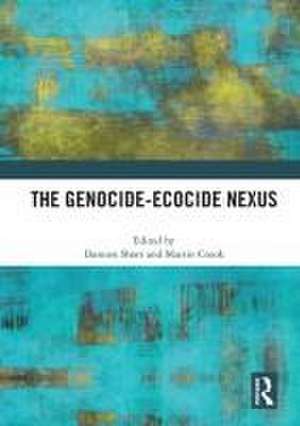The Genocide-Ecocide Nexus
Editat de Damien Short, Martin Crooken Limba Engleză Paperback – 29 ian 2024
The destruction of ecosystems, ecocide, can be a method of genocide if, for example, environmental destruction results in conditions of life that fundamentally threaten a social group's cultural and/or physical existence. Given the looming threat of runaway climate change, the attendant rapid extinction of species, destruction of habitats, ecological collapse and the self-evident dependency of the human race on our bio-sphere, ecocide (both "natural" and "manmade") will become a primary driver of genocide. Through nine chapters of cutting-edge research, this book examines specific case studies in geographical settings such as Iraq, Sudan, Nigeria and Brazil, to highlight and analyse the crucial connections and vectors of the genocide-ecocide nexus. This book will be of great value to scholars, students and researchers interested in the ecological crisis, Environmental Justice, the political economy of genocide and ecocide as well as environmental human rights.
The chapters in this book were originally published as a special issue of The Journal of Genocide Research.
| Toate formatele și edițiile | Preț | Express |
|---|---|---|
| Paperback (1) | 385.29 lei 43-57 zile | |
| Taylor & Francis – 29 ian 2024 | 385.29 lei 43-57 zile | |
| Hardback (1) | 1002.26 lei 43-57 zile | |
| Taylor & Francis – 10 feb 2022 | 1002.26 lei 43-57 zile |
Preț: 385.29 lei
Nou
Puncte Express: 578
Preț estimativ în valută:
73.73€ • 76.54$ • 61.48£
73.73€ • 76.54$ • 61.48£
Carte tipărită la comandă
Livrare economică 24 martie-07 aprilie
Preluare comenzi: 021 569.72.76
Specificații
ISBN-13: 9781032183084
ISBN-10: 103218308X
Pagini: 188
Dimensiuni: 174 x 246 x 16 mm
Greutate: 0.32 kg
Ediția:1
Editura: Taylor & Francis
Colecția Routledge
Locul publicării:Oxford, United Kingdom
ISBN-10: 103218308X
Pagini: 188
Dimensiuni: 174 x 246 x 16 mm
Greutate: 0.32 kg
Ediția:1
Editura: Taylor & Francis
Colecția Routledge
Locul publicării:Oxford, United Kingdom
Public țintă
Postgraduate and UndergraduateNotă biografică
Damien Short is Director of the Human Rights Consortium (HRC) and Professor of Human Rights and Environmental Justice at the School of Advanced Study, University of London. He has spent his entire professional career working in the field of human rights, both as a scholar and human rights advocate and activist. He has researched and published extensively in the areas of indigenous peoples’ rights, genocide studies, reconciliation projects and environmental human rights. He is Editor in Chief of the International Journal of Human Rights.
Martin Crook is Associate Lecturer at Roehampton University and a PhD Candidate at the School of Advanced Study, University of London. His research interests include human rights and the ecological crisis, the political economy of genocide and ecocide, energy harms and development. He is Assistant Editor of the International Journal of Human Rights.
Martin Crook is Associate Lecturer at Roehampton University and a PhD Candidate at the School of Advanced Study, University of London. His research interests include human rights and the ecological crisis, the political economy of genocide and ecocide, energy harms and development. He is Assistant Editor of the International Journal of Human Rights.
Cuprins
Introduction 1. Developmentalism and the Genocide- Ecocide Nexus 2. The Genocide- Ecocide Nexus in Sudan: Violent “Development” and the Racial- Spatial Dynamics of (Neo)Colonial- Capitalist Extraction 3. The Politics of Ecocide, Genocide and Megaprojects: Interrogating Natural Resource Extraction, Identity and the Normalization of Erasure 4. Green Criminology and State- Corporate Crime: The Ecocide- Genocide Nexus with Examples from Nigeria 5. The Merauke Integrated Food and Energy Estate (MIFEE): An Ecologically Induced Genocide of the Malind Anim 6. “We Won’t Survive in a City. The Marshes are Our Life”: An Analysis of Ecologically Induced Genocide in the Iraqi Marshes 7. The Colonial Reproduction of Deforestation in the Brazilian Amazon: Violence Against Indigenous Peoples for Land Development Postscript: Call to Action - The Climate Emergency: A Statement from Genocide Scholars on the Necessity for a Paradigm Shift
Descriere
Through nine chapters of cutting-edge research, this book examines specific case studies in geographical settings such as Iraq, Sudan, Nigeria and Brazil, to highlight and analyse the crucial connections and vectors of the genocide-ecocide nexus.
